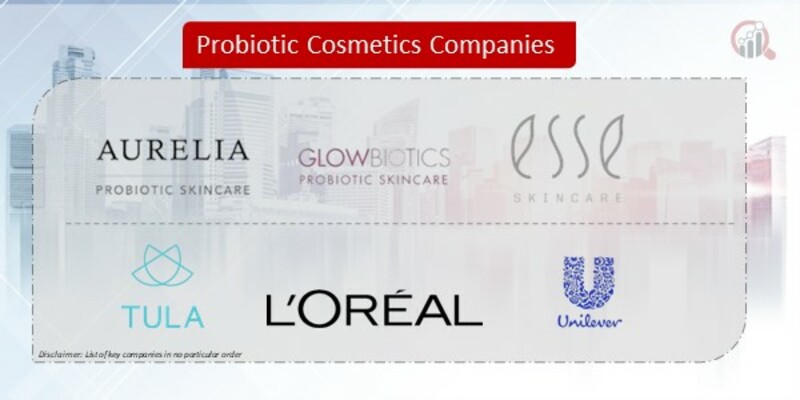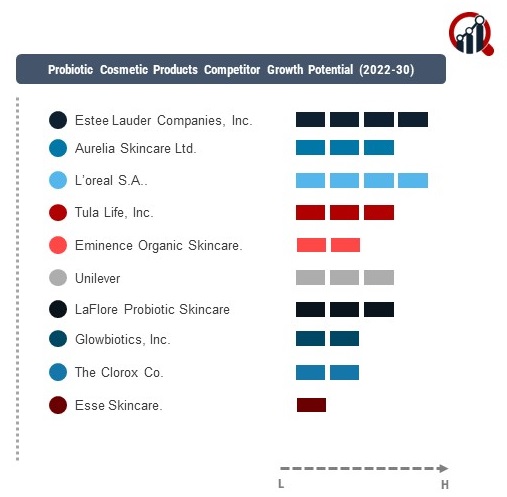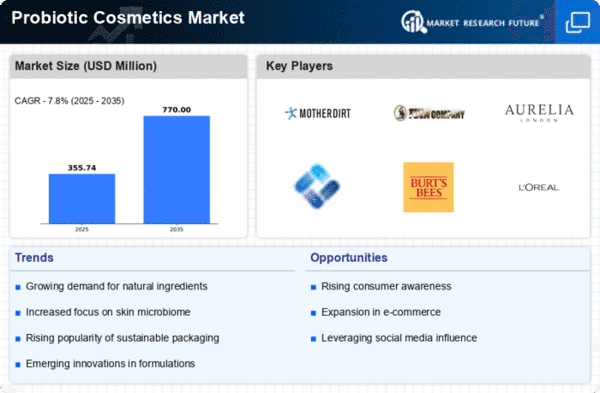Top Industry Leaders in the Probiotic Cosmetics Market
 The competitive landscape of the probiotic cosmetics market is marked by key players implementing various strategies to capitalize on the growing demand for skincare products that incorporate probiotic ingredients. These players significantly influence industry dynamics, and their strategies collectively shape the overall competitive scenario.
The competitive landscape of the probiotic cosmetics market is marked by key players implementing various strategies to capitalize on the growing demand for skincare products that incorporate probiotic ingredients. These players significantly influence industry dynamics, and their strategies collectively shape the overall competitive scenario.
Key Players:
The probiotic cosmetics market features several key players that have established themselves as major contributors. Prominent companies in this sector include Esse Skincare, TULA Skincare, Aurelia Probiotic Skincare, Clinique Laboratories, and LaFlore Probiotic Skincare. These entities leverage their brand recognition, research and development capabilities, and distribution networks to maintain a strong presence in the market.
Strategies Adopted:
The probiotic cosmetics market adopt various strategies to address consumer preferences and market trends. A common approach involves continuous product innovation, with companies introducing skincare formulations that harness the benefits of probiotics for improved skin health. Additionally, strategic collaborations with dermatologists, skincare professionals, and wellness influencers contribute to expanding market reach, ensuring that probiotic cosmetics gain credibility among consumers.
Efficient supply chain management and cost-effective manufacturing processes are critical elements of the strategies adopted by key players. These strategies enable companies to offer competitive pricing while maintaining high-quality products, ensuring customer satisfaction.
Market Share Analysis:
The probiotic cosmetics industry is influenced by several factors. Product efficacy, safety, pricing, and brand reputation play pivotal roles in consumers' purchasing decisions. Companies that invest in research and development to enhance the effectiveness of their probiotic formulations gain a competitive edge. Furthermore, effective marketing, robust distribution channels, and responsive customer service contribute significantly to brand loyalty and market share.
News & Emerging Companies:
The probiotic cosmetics market has witnessed the emergence of new companies responding to the increasing demand for skincare solutions that focus on the skin microbiome. Emerging players, such as Mother Dirt and Gallinée, have entered the market with innovative probiotic skincare products and a focus on addressing specific consumer needs. These new entrants often bring fresh perspectives to skincare technology, contributing to the diversification of available products.
Industry Trends:
Recent trends in the probiotic cosmetics industry include advancements in formulation technology and a growing emphasis on the skin microbiome. Companies are investing in research and development to introduce probiotic cosmetics that target specific skin concerns, such as acne, inflammation, and aging. Additionally, there is a noticeable trend of companies incorporating prebiotics into their formulations to further support the growth of beneficial bacteria on the skin.
Furthermore, the industry has witnessed increased investments in digital marketing and e-commerce strategies. Companies are adapting to changing consumer behaviors by enhancing their online presence, participating in e-commerce platforms, and leveraging social media for targeted advertising. This move not only addresses the evolving needs of tech-savvy consumers but also positions these companies strategically in the competitive online market.
Competitive Scenario:
The probiotic cosmetics market is marked by intense competition among key players, driven by the increasing consumer demand for skincare products that promote a healthy skin microbiome. Companies are engaged in a race to offer not only innovative and effective products but also solutions that align with broader trends of natural skincare and microbiome-friendly formulations.
The market is also influenced by factors such as changing consumer perceptions of beauty, advancements in microbiome research, and the ongoing global movement toward products that prioritize skin health. Manufacturers must adapt swiftly to market demands, ensuring that their probiotic cosmetics not only meet the highest efficacy standards but also address the evolving concerns of consumers seeking holistic skincare solutions.
Recent Development
The probiotic cosmetics market witnessed a notable development with key players focusing on advanced formulations and expanded product lines. Several major companies announced significant investments in research and development to introduce probiotic skincare products with targeted solutions for specific skin concerns. These formulations often incorporated a combination of probiotics, prebiotics, and other natural ingredients, catering to the growing demand for multifunctional and specialized skincare solutions.
Moreover, there was a discernible trend of companies enhancing their sustainability practices in manufacturing. Major players announced initiatives to use eco-friendly packaging materials and reduce their overall environmental footprint. This move not only resonated with environmentally conscious consumers but also positioned these companies as leaders in sustainable manufacturing within the cosmetics industry.











